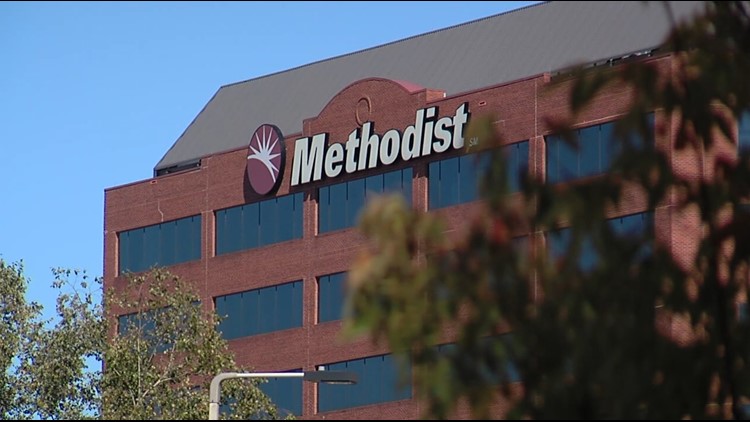MEMPHIS, Tenn. — The United States filed a lawsuit against Methodist Le Bonheur Healthcare and Methodist Healthcare Memphis Hospitals (Methodist), accusing the healthcare system of paying West Clinic for patient referrals.
The U.S. Department of Justice's Attorney's Office claimed payments Methodist made to West Clinic for unlawful patient referrals were disguised as a management partnership from January 1, 2012 to December 31, 2018.
The DOJ said Methodist continued the illegal partnership even after a whistleblowers’ lawsuit was filed on May 30, 2017 by Jeffrey H. Liebman, who is the former President of Methodist University Hospital.
West Cancer Center CEO, Mitch Graves, submitted a statement to ABC24 explaining that the center reached a settlement with DOJ for the 2017 lawsuit, which has since been closed.
“West Cancer Center settled with the plaintiffs on the 2017 Qui Tam lawsuit last year and is no longer a defendant. We believe the allegations are totally unfounded but settled to avoid a potentially prolonged lawsuit to focus on caring for our cancer patients. At West Cancer Center and Research Institute, our patients are our top priority, and this lawsuit was a distraction to our mission of providing outstanding cancer care.”
Basis of the latest lawsuit
In this latest lawsuit, the DOJ said Methodist bought all the outpatient locations owned by West Clinic, which happens to be the “largest” oncology - or cancer - study practice in Memphis.
The DOJ said Methodist did not have a cancer treatment center at the time of the purchase, and claimed the system committed several violations of the False Claims Act (FCA) and the Anti-Kickback Statute (AKS).
The U.S. said that, to cover up the payments Methodist made for illegal patient referrals, an agreement was made for West Clinic to provide management services for Methodist’s adult oncology service.
Under the deal, the DOJ said West Clinic patients were illegally allowed to receive outpatient and inpatient treatment at hospital locations owned by Methodist from physicians who were actually employed by West Clinic.
However, the DOJ claimed in the suit there was actually never a formal partnership between Methodist and West Clinic, because to do so may have violated regulatory requirements.
The DOJ said this exchange of services allowed Methodist to unlawfully receive more money from Medicare related to cancer care, which the DOJ said, without the illegal partnership, would have gone to West. The lawsuit claimed this allowed Methodist "to establish a new stream of income in the reimbursements for outpatient treatment."
The lawsuit also said because of the Methodist-West Clinic deal, competing systems, such as Baptist Memorial Hospital, did not get the referrals for inpatient services from West Clinic that they normally would have received.
Additional complaints in lawsuit
The DOJ claimed that in addition to monopolizing the outpatient and inpatient cancer patient care, Methodist also made a $7 million investment in ACORN research, LLC. The suit said West Clinic and its Medical Director and shareholder, Dr. Lee Schwartzberg, had a personal interest in ACORN.
The lawsuit claimed the deal allowed Methodist to quickly repay a $3.5 million debt it owed to West Clinic and Dr. Schwartzberg.
The DOJ also said Methodist was able to illegally bill Medicare for items like the newly purchased facility, components of outpatient treatment, chemotherapy, and drugs provided for cancer treatments - and that gave Methodist a distinct discount in costs through the 340B Discount Drug Program.
The DOJ said this all led to Methodist receiving $50 million in profits in a single year.
The DOJ said the deal lasted seven years, through which referrals increased to Methodist, and in turn, Methodist's payments to West Clinic increased.
Methodist Healthcare's response
In a statement released Tuesday, Methodist called the allegations "familiar" and said they "mischaracterize the relationship between MLH and West Clinic."
They went on to say, "The affiliation’s compensation structure was designed by respected outside experts who determined it reflected fair market value for such services. Our payments were appropriate, and MLH received the services due under affiliation agreements. The government’s belated decision to intervene in the suit two years after it declined to do so has changed nothing about the case."
Methodist said it would refute the allegations "in the appropriate legal forum," but that the agreement was "proper." It said it had no intentions of overcompensating West Clinic for its management services in order to receive more patient referrals in return.
West Clinic's response
“West Cancer Center settled with the plaintiffs on the 2017 Qui Tam lawsuit last year and is no longer a defendant. We believe the allegations are totally unfounded but settled to avoid a potentially prolonged lawsuit to focus on caring for our cancer patients. At West Cancer Center and Research Institute, our patients are our top priority, and this lawsuit was a distraction to our mission of providing outstanding cancer care.” - West Cancer Center CEO, Mitch Graves
Editor's Note: Video above is from October 2021.



